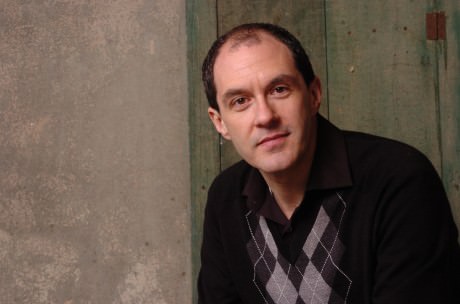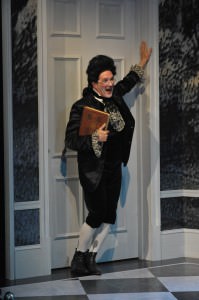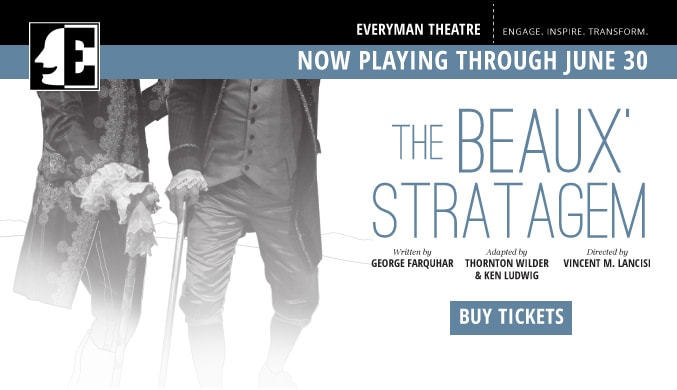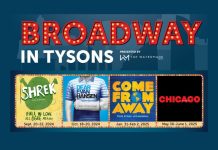“When a man is courting, his is not himself, he the oil-painting on which the sketch is based.” A witty line of comedy delivered from the lovely character Kate Sullen in Everyman Theatre’s production of The Beaux Stratagem. So just when is a man himself, you ask? Well when he’s sitting down with me talking over how much fun this uproarious restoration comedy is, and what a wonderful romp it’s been playing in this sexual comedy of manners. I had the distinguished honor of sitting down face to face with long-standing Everyman Company member Bruce Randolph Nelson, getting inside his mind to find out just what’s it all about. Between working on The Beaux Stratagem and the incredible inaugural season the company has had in its new home, we covered it all, and I’m delighted to share it with you.
Amanda: How long have you been a company member with Everyman, and what was it like being a part of the big move from the smaller house over on Charles Street to the new big house here on Fayette?

Bruce: I think I became a company member, somewhere back in 2002. I think our Artistic Director, Vincent Lancisi, had first seen me when I was doing Elephant Man, it was my first professional gig in the area at Olney Theatre, and that was when he began to see me as a more serious actor rather than a comic actor. And then I was doing The Crucible at Everyman during the 2000-2001 season, I was originally just supposed to play the court scribe, but I ended up getting bumped up to play Reverend John Hale. I think this gave Vinny a chance to see me as a more serious actor, really rounding me out and then he directed me in Watch on the Rhine the following season and that was that.
WOW! Eleven years! That’s a long time to be around, especially considering most theatres just don’t even have companies anymore, so it’s quite a thing, because Everyman is the last of its kind, having an actual ‘company’ as an Equity house, it might be the last in all of Maryland, but certainly the last in Baltimore. I’m very lucky that Everyman is still set up that way, that they still have a company and that I’m a part of it.
As far as being here on Fayette Street, I have to say that my first time walking out on that stage, which was for our inaugural production of August: Osage County, it was surreal. We’re no longer in this one-story, 175 seat house. We’re now in this big grown-up space, playing to this big grown-up audience. And my thoughts initially went right to Vinny, and it what it was like for him; his thought process. Just thinking about the journey he’s gone through, you know with how much drive and commitment he must have to stick with this so long. I’ll admit I have trouble committing to a book so for him to be with it as long as he has it just blows my mind. He’s been through it all, starting out with the little store front space and now he’s arrived here in this big beautiful space.
Vinny has created this viable home for actors; you know the life, it’s an itinerant lifestyle. There’s no “safe place” and we’re always sort of scrounging for work, but with what he’s created here, I feel like I’ve come home. Not that Charles Street wasn’t home but this is our home here now, and this is really actually home. That’s what true about this whole transition, being home. I was just saying to Vinny how this place is a new presence in the community and how it’s going to lift the community presence around it. It’ll be rehabbing the area, if we’re here taking pride in the place— making sure we keep the curb clean and bringing new patrons to the area, it’ll give the surrounding area a positive facelift.
For this production of The Beaux Stratagem, you’re tackling dual roles; the first act sees you as the busybody innkeeper Bonafice, and the second act sees you as the flamboyant Foigard. It must be quite the task to keep them separate, what’s it like doing double duty?
Good question! I uh, <sigh> well they’re just so vastly different, and I love that they’re at different ends of the play. Because there’s the belly and the hair for the one and then there’s the makeup and the wig for the other, they’re just both so much fun. Once I sort of created the little mincing walk for Foigard, which has echoes of a mincing walk that I’ve used for another character in another production, and I found the waddle for Bonafice, I was really ready to go with both of them.
I’m an outside-in actor, get me the right prop, voice, or costume, and I’ll build a character on that structure. I give myself permission to go there and be crazy, making these characters over the top and I rely on the directors to say “that’s too much, pull it back,” or “bring it forward even more.” I’m the first one to be foolish and zany. For most actors it’s about thinking what the character wants down deep inside, getting into that headspace and for me I leap right in and then think about those choices in retrospect. Maybe I just have more abandon when it comes to making these characters. It’s funny because midway through a run I’ll stop and think— why did I just do that choice? Because I just haven’t put in the head time yet and sometimes it really works out and sometimes I make the adjustments as I go.
Both of these characters and the play itself is really all about the comedy, so do you find that difficult?
I’m always reminding myself that different audiences have different energies. So maybe “pee-your-pants funny” is different for different people. The opening night audience, who may be primed with that excitement because it’s opening night, may certainly have a much louder response of laughter and enjoyment than other audiences, and it’s really just about remembering that each audience is different. In a weird way it’s not about making the audience laugh, it’s just about doing your job. There are moments that are going to be funny and moments that aren’t and if you get caught up all the time in whether or not the audience is laughing at what’s supposed to be funny it won’t work.
I think that’s the Achilles heel of an actor— it’s all about me-me-me! That I’m the funny one in the spotlight and they should be laughing at me. But to work as a part of a team you have to share that wealth, our life’s work is getting to grow into these fabulous roles but also getting to share the light. And I think sometimes we forget that, but when we remember it all comes together.
I’ll give you the perfect example. I actually have a moment on stage, when I’m playing Bonafice with Sean McComas, who plays Daniel, where we leave the inn so that Gloss (Stephen Patrick Martin) can propose to Cherry (Dorea Schmidt). Sean and I wander offstage but then you see us again in that big window, and we’re playing around doing this big comic thing. Well there are nights when we do this big comic thing in the window, which we’ve changed up a little since, and I come off-stage hearing nobody laugh or really respond to it and I’m like – “But we were adorable!” And then I have pause and remind myself, “Bruce, it’s not your moment.” I think that’s the remind, the non-laughter, it reminds you that there are others on the stage, and that it really is all about sharing and working together.
Do you have any pre-show routines or rituals that help you really get into the restoration comedy era headspace – or specifically into the heads of Bonafice and Foigard?
You know, when I was an acting student at Towson University, I always thought warm-ups were strange. They felt pushed, almost forced, and they were just strange. For me, lately it’s been just reading a couple of pages in a book or having that chitchat and banter in the dressing room before heading out on stage. What I’m not going to do is put the iPod on and rock out to some intense music. I’m going to be calm.
Right now, I’m actually imagining getting ready for Red (Everyman’s November 2013 production) and for that I can imagine myself just sort of pacing around the scene shop running lines. I want my warm-up to be about my relationship with the other cast member (this is a two-person show) And I think my ritual has to have that social aspect, regardless of the show because theatre for me is social. Growing up I was a military brat, well I’m still a military brat, because once a military brat, always a military brat, but in our last move, that landed us here in Columbia, because my father decided that he didn’t want to move the family around anymore, I joined up with the drama/theatre in high school because I was looking for this safe haven, this place to feel like I was home and be social and just be accepted. And I found it in theatre, so it’s really important for me to have that social element. For me it’s non-ritualized but I have my own ‘routine’ within the non-ritual. Warming up for great lengths of time would just seem strange to me because for me it’s not about that. And I’ve done those high intensity, extremely physical warm-ups and then I’m exhausted for the show. So I just don’t do that.

For these characters – specifically – I think just sitting in front of the mirror putting on the makeup and wig does it, for Foigard it’s certainly enough. I had a professor at Towson who used to say that if you can’t walk off stage and just immediately turn it off, or just as quickly turn it back on, then it’s not acting. So I’m not all caught up in being this character for a lengthy period of time except for when I’m on stage. Foigard storms out of the scene and slams the door. And as soon as I close that door and I’m backstage I’m just Bruce in a wig and makeup. I take a moment, breathe, let it go, look around, wave at the stage manager, listen to what’s going on out there, wait for my cue, and then Boom, I’m on again.
This little comic gem of a production is rarely done, what has been the overall experience working with this adaptation?
Oh this particular group? It’s a joy. If you figure that when we did August: Osage County it was all doom and gloom backstage, because the play was such a dark and heavy play, it wasn’t very buoyant backstage. This is just joyous because we have a buoyant backstage. Ludwig makes this approachable, readable, identifiable script, and it just really moves. There are these lovely speeches that are perfectly set with just the right amount of “nudge, nudge…wink, wink,” and it becomes so much fun. I think the reason no one does this is because it’s such a costly endeavor. I mean it’s cast forever, costumes forever, and set forever. It’s expensive. And it’s a shame because it’s such a fun show!
Both of your roles in this show are very comical. Do you believe that comedy is more difficult to pull off than drama and tragedy, and how are you making this comedy a success for you?
Yes I do indeed, hands down because comedy is so product driven. Because if the audience laughs then you know you did it just right, you had that line right where it was supposed to be, your timing was right, everything about the moment was just right. But if they don’t laugh then you’re going into your head trying to figure out what went wrong, because you need to know what you did or didn’t do. You have more wiggle room, I think, to land your performance when you’re working with a serious piece. You do your part, and it happens, the audience might surprise you with tears or their reaction, but for the most part you know it got across. Comedy is another dimension to get the performance right. If you don’t get the laugh you come off stage thinking “what do I need to do to make it work,” and of course “damn them for not laughing!”
As far as performing more comedy verses drama I think right now it’s pretty neck and neck, but it feels like I have more experience with comedy. This (comedy) fits like a glove. With serious work the audience goes away in a sense, you’re just there doing your thing, but with comedy the audience is very much an active part of what you’re doing. When I work with students and their monologues, if they bring me a dramatic monologue the first thing I have them do is find what’s funny about it. The same thing for a comedic monologue, I have them find what in it is serious. It’s about finding the opposites in their place because nothing is ever just straight comedy or just straight drama.
Do you have a favorite moment that really just cracks you up?
I still giggle when Cherry (Dorea Schmidt) is being grilled by Archer (Danny Gavigan.) She gets all into it with this funny little up-stage Lucille Ball style turn. She’s adorable and she has this crazy comical instinctive mind even when she’s off stage. She’ll say the most ridiculous things and they’re so funny. Like one time she was talking about how ‘what if Cherry had asthma and of course she’d have this little wooden inhaler and then she’d be stuck getting the splinters out of her teeth…’ to have such a free mind that freely associates the way she does, it’s just really funny.
Is there a moment or event during the show that you wish you were a part of?
You’re waiting for me to say the sword fighting, I know it. And it would make sense to say the sword fight, but I am so glad that I am not in that sword fight. I don’t sword fight. NO THANK YOU!
What I do love is production work, those little off-stage moments that nobody sees but make the production function. I have one moment where I slide furniture out of the way to make sure that the actors can get by and up onto the stage. And I do it, I move the furniture, and I feel very important. I’m embodying the team spirit. If help is needed in that sense I want to do it. You’ll never hear me say, “Oh doing that isn’t my job,” if help is needed I want to do it. In fact there are sometimes when I think I’m being helpful and moving stuff and it actually is someone else’s job and then I have to just sort of put things back. I can’t imagine going through life without a good dose of humility and doing the little things really helps keep that in check.
Once Beaux Stratagem closes, what’s up next?
Well, I do get a little teeny tiny bit of downtime, but then I start rehearsals of Animal Crackers (the Groucho Marx musical), at CENTERSTAGE. Just today I had my morning walk around Lake Montebello and I was doing lines on tape. I’ve got all of my lines recorded so I can listen to them, it helps me learn. I’ve got my book of Groucho’s letters, they’re fascinating to read and they’re really helping me get a feel for what he sounds like, so I’m very excited. It’s amazing to watch him ad lib, watching him on that show You Bet Your Life. I mean it was basically a chance for him to host a talk show where he got a chance to banter about with people. He’s so fast with the dry stuff, it’s a lot of fun. And yes, everyone wants to know about this show because it’s a musical. I’m an actor who sings, as opposed to a singer who acts. I can carry a tune, and with a little work I think I’ll be ahead of the ballgame.
Now this show will overlap just a little bit with Everyman’s production of Red. As this finishes up I’ll be in rehearsals for Red, and of course whenever you find yourself in that position with the overlapping shows you say to yourself “Never again!”- that you’re never ever going to do it again, and then of course you do just as soon as the next two big projects come along.
Bruce can be seen on stage in The Beaux’ Stratagem playing through June 30, 2013 at Everyman Theatre— 315 West Fayette Street, in Baltimore, MD. For tickets, call the box office at (410) 752-2208, or purchase them online.
LINK
Read my review of The Beaux Stratagem.





